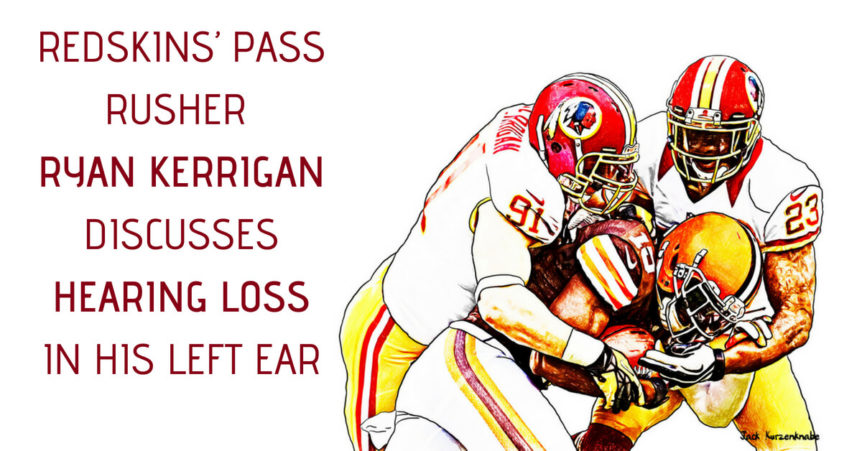- Custom vs. Over-the-Counter Hearing Aids: Finding the Right Fit for Your Ears - April 10, 2024
- Real Stories, Real Triumphs: Cochlear Implants Make All the Difference - March 15, 2024
- Common Misconceptions About Hearing Aids - February 14, 2024
Hearing loss affects many people, no matter their age, race, gender, class, or nationality. Hearing loss is not a barrier to one’s success, as Ryan Kerrigan, a 16th overall NFL draft pick in 2011 has shown. Kerrigan is a pass rusher who spent his college years in the storied Purdue football program. Kerrigan was a unanimous all-American, and was voted all-Big Ten first team when he was a senior. So, it was perhaps no surprise when the Washington football team selected him to be an integral part of their defense.
Childhood Hearing Loss
If there was a surprise at all, however, it was that Kerrigan has made his excellent career on the gridiron while experiencing severe hearing loss. Kerrigan had many debilitating ear infections as a child, and by the time he was eight years old, it was determined that he had significant hearing loss in his left ear. He discussed his hearing loss at a recent media day, telling the assembled reporters that his hearing is not completely gone: “But if I put a headphone in there and turn it up, like, super-freaking loud I can hear.”
Many people with hearing loss have learned how to best disclose their hearing needs to those around them. Kerrigan is no exception. He explained to Sarah Schorno Kogod of NBC Washington that his hearing is not exceptional to him, and that he knows what his hearing needs are: “I feel pretty normal with it. It’s only when someone is directly on my left that I have a hard time with it. Other than that, it doesn’t bother me at all.”
Where his hearing needs have not necessarily impacted his day-to-day abilities to be in the world, they have also not impacted his ascent into the NFL. The NFL combine, when prospective professional footballers showcase their talents for coaches throughout the league in the hopes of being selected in the upcoming draft, is typically a time when players’ bodies are picked apart and assessed for “insufficiencies.” Kerrigan’s hearing loss may have been perceived as a detriment to his playing ability, but he went in confidently, noting, “I addressed it at the combine and it hasn’t hindered my performance.” His hearing loss was not necessarily something he felt he needed to address, however, and he explained further that, “I’m sure the team knows, but we haven’t really talked about it.”
There have certainly been moments in Kerrigan’s career with Washington where his teammates belatedly learned about his hearing needs. Preston Smith, an outside linebacker and Kerrigan’s teammate, relates the story of how he learned about Kerrigan’s hearing needs: “I was talking to him one time, standing on his left, and I was trying to get insight on the play,” he relates. “Then, he turned so he could hear. And I was like, ‘Man, I’ve been talking this whole time and you didn’t hear me.'”
Kerrigan’s hearing loss has not affected his play. Since joining the Washington team seven years ago, Kerrigan has racked up 71.5 sacks. In 2017 and 2016, respectively, Kerrigan had team-high totals of 13 and 11 sacks.
Athletes with Hearing Loss
Kerrigan is amongst other NFL greats who are deaf or hard of hearing. They include Larry Brown, Bonnie Sloan, Kenny Walker, and Flozell Adams. Derrick Coleman was the first legally deaf person to play in the NFL, playing fullback for the Seattle Seahawks, the Atlanta Falcons, and the Arizona Cardinals. Coleman lost his hearing at 3 years old as the result of a genetic disorder. After winning the Superbowl with the Seattle Seahawks in 2013, Coleman published his book titled “No Excuses: Growing Up Deaf and Achieving My Super Bowl Dream.” As he told CNN, Coleman’s biggest challenge in his career has been “making sure the quarterback knows that I’m there,” Coleman said. “I’m yelling at him letting him know I’m in. That means you take an extra quick peek at me, that’s all.” Coleman perfected lip reading in order to be able to communicate with his teammates and the quarterback, in particular, ensuring that he knows all of the plays—especially the audibles—that he is engaging in on the field.
The increasing exposure of successful deaf and hard of hearing people such as Kerrigan and Coleman will go a long way to demonstrate that hearing loss is not a debilitating or detrimental condition, but one that people can thrive with. To seek treatment for hearing loss, contact us today at Better Hearing.

